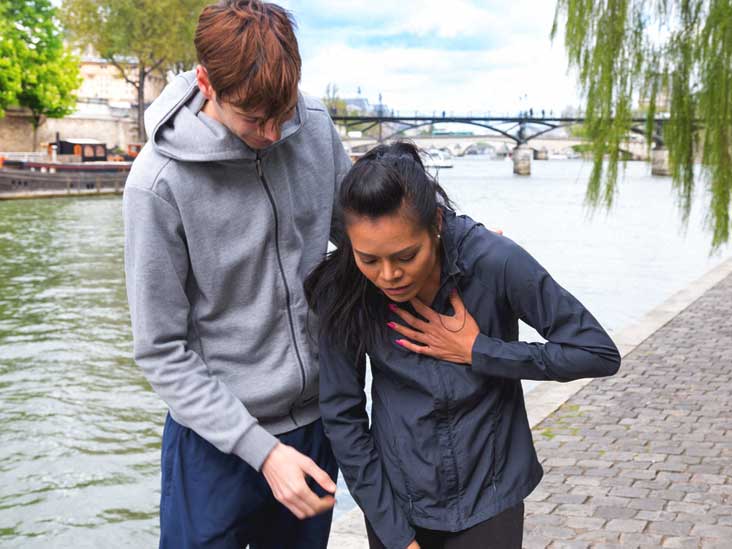

Here are some actions you can take when you feel the tightness coming on: 2 The Lung Institute provides a great list of ways to confront your chest tightness from asthma. It’s important, though, if you are beginning to experience chest tightness, that you take action to counter it. If you can prevent chest tightness, that's ideal. If you are like me, chest tightness actually exacerbates my distress as well, making a vicious cycle that moves quickly towards a serious attack. It’s common for asthmatics to experience chest tightness as a symptom during flare-ups, especially if there are stress and anxiety involved, like in my case. Any condition that evokes this stress response can lead to the chest tightening. However, chest tightness is also associated with other conditions including anxiety, COPD, heart disease or even a respiratory virus. 1 A sympathetic stress response is a “fight or flight” stress response, common in anyone experiencing a threatening situation, like an asthma attack. What is happening in your body when you experience tightness of your chest? Well, the tightness comes from the muscles in your chest, and other areas of your body, contracting usually due to a sympathetic stress response.
/coughing-and-quitting-smoking-2824761_V2-01-74cc3214c63c46cc81c8f99bc292f1d2.png)
So, I dove into a bit of research and this is what I found.

I like to understand my fears, I find it helps me to rationalize and reduce anxiety. My biggest fears to this day are drowning and suffocating, the feeling of not being able to breathe stemming directly from the tightness of my chest during an asthma attack. I’m thankful for this, because, in all honestly, it’s terrifying. When I do experience it, it’s usually accompanied by stress or anxiety, as an exacerbation to my initial flare. You can also schedule an appointment online or through m圜EENTAchart.I don’t always experience this symptom with my asthma, it’s a secondary symptom, mostly. To make an appointment with him or any of our ENT doctors, call 70. Heavner practices in our Steele Creek office. For specific medical questions, please consult your physician. This blog is for informational purposes only. “However, if it persists for more than 2-3 weeks or you get to the point of not being able to eat at all, it needs to be evaluated.” “Most factors causing difficulty swallowing are benign," CEENTA ENT doctor Brett Heavner, MD, said. It’s important to get a diagnosis from a doctor to determine what, if anything, you might have. However, these symptoms don’t automatically mean someone has cancer. Other symptoms include weight loss, hoarseness, a chronic cough, vomiting, and esophageal bleeding. People with this cancer might start eating smaller portions of food or switch to an all-liquid diet because of swallowing problems.

The most common symptom of esophageal cancer is difficulty swallowing. People with esophageal cancer may also feel like food is stuck in their throat, or they may even start choking on it. If a tumor is large enough, it can restrict food passing by it. More seriously, chest pain when swallowing might be a sign of esophageal cancer. If it’s caused by medication, an alternate drug might be available.Įsophageal cancer and throat pain when swallowing If allergies are the cause, avoiding the allergen and taking medicine could help. If an infection is the cause, medicine may help. If acid reflux is the cause, over-the-counter of prescription antacids could help. Your doctor can recommend a number of treatments based on the exact cause of your esophagitis. However, if the pain lasts more than a few minutes, you think food is stuck, you have a history of heart disease, you have shortness of breath, or you experience severe vomiting, you need emergency care as they are signs of a more serious condition. If you experience symptoms for more than a few days and don’t get better with antacids, they make eating difficult, or you also have flu symptoms, a doctor’s visit is recommended. Infants with esophagitis might experience feeding difficulties, too. Not only would you have swallowing pain, but you might also have difficulty swallowing, food might get stuck in your esophagus, or you might get heartburn. Esophagitis has a number of possible causes, including acid reflux, infections, allergies, and reactions to some medicines. This is an inflammation of the esophagus, the muscular tube that connects the throat to the stomach. If you have pain in your chest whenever you swallow, you may have a condition called esophagitis. What is causing this pain, and is there any way to treat it? Every time you swallow your food, you get a sharp pain in your chest. Eating has become a very unpleasant experience for you.


 0 kommentar(er)
0 kommentar(er)
